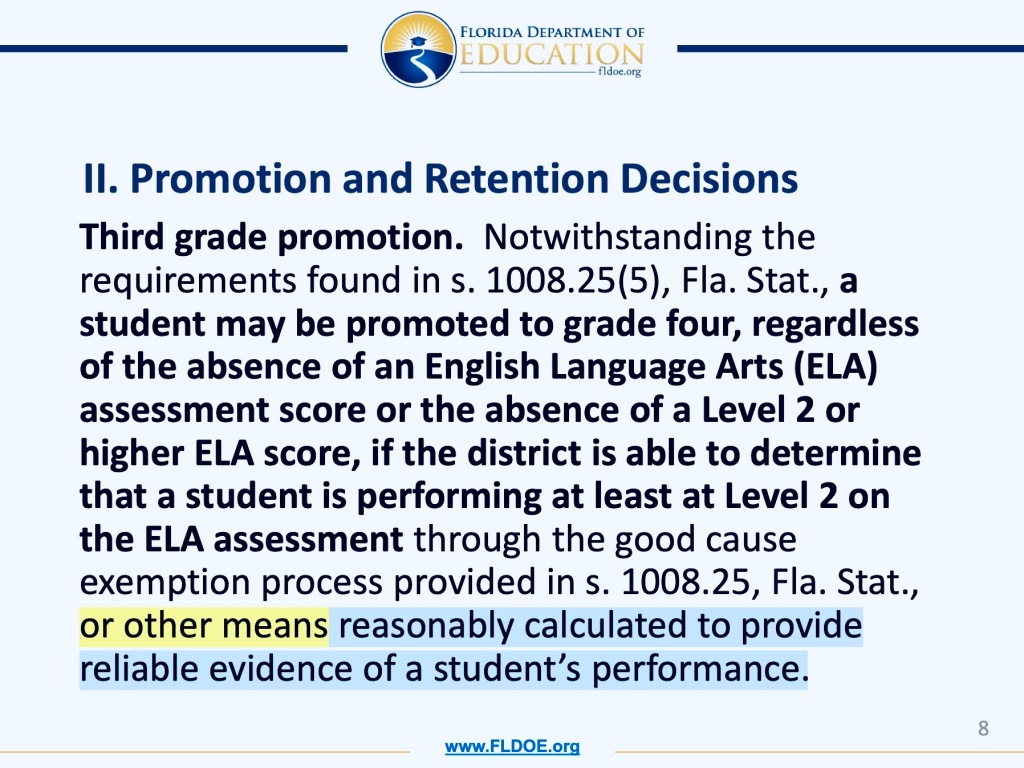Tags
180 days, alternative assessment, Grade retention, Opt Out, parents push back, promotion by report card, Retention, Third grade, Third Grade FSA, Third Grade Promotion, Third grade retention
by Sandy Stenoff
The executive order signed by Florida’s Commissioner of Education on April 9 waives all FSA requirements for this year and grants districts great flexibility to promote third graders by means other than a test. And yet, some schools are still telling parents of remote third grade students, who have NO documented reading deficiency, that if they don’t send their proficient third graders in to school to take an in-person assessment, they’re going to be retained in the third grade.
Are school districts REALLY prepared to retain proficient third grade students with NO reading deficiency THIS YEAR? – under an executive order?
Parents – Is your school district just testing YOU now? The new parenting stamina test?
If parents have kept a child at home all year because of considerable health risks to the family during the pandemic, AND the school wants the child to take a test in person to prove what the state is not even requiring, then the parents must decide how much of a health risk they are willing to accommodate just to appease the school.
The state is not requiring that third grade students complete a test to demonstrate that they should be promoted. The order is clear. It ALSO permits “OTHER MEANS, reasonably calculated to provide reliable evidence of a student’s performance.
FACT: The Commissioner has said he would LIKE all students to test, but the executive order does not say THAT.
It bears repeating: The state is NOT REQUIRING a good cause exemption this year.

the good cause exemption process provided in s. 1008.25, Fla. Stat., OR OTHER MEANS, reasonably calculated to provide reliable evidence of a student’s performance.
FLDOE – April 9, 2021
At last check, OR still means one or the other. Either. Not both.

When a school threatens harm to a child in order to force parents into compliance with their demands, we call that emotional blackmail. It’s bullying, it needs to STOP and YOU can stop it by shining a light on it.
Districts have publicly repeated the FLDOE’s position on “treating families with grace and compassion.” If the districts are saying one thing, but the schools are doing another, then parents need to ask the district to clarify their position to the schools.
Here’s a letter to district leadership to help you do that:
Dear Superintendent_______________,
We have kept our child at home all school year because of health concerns during the pandemic. I am being told by my son’s school that if he does not come into school for an in-person assessment to satisfy a good cause exemption, then he will be retained in the third grade.
From the FLDOE executive order of April 9 on third grade promotion:
“II. Promotion and Retention Decisions
Third grade promotion. Notwithstanding the requirements found in s. 1008.25(5), Fla. Stat., a student may be promoted to grade four, regardless of the absence of an English Language Arts (ELA) assessment score or the absence of a Level 2 or higher ELA score, if the district is able to determine that a student is performing at least at Level 2 on the ELA assessment through the good cause exemption process provided in s. 1008.25, Fla. Stat., or other means reasonably calculated to provide reliable evidence of a student’s performance.”
I am respectfully requesting that the “other means” specified in the executive order be (name’s) grades, which he earned throughout the school year and his report card, which, together, are “reasonably calculated to provide reliable evidence of a student’s performance.”
With the flexibility granted to districts by the state because of the pandemic, and in the absence of a test performed in person – are you prepared to retain a proficient student; to force him to repeat the third grade needlessly, in spite of his demonstrating that he has NO reading deficiency?
From the FLDOE document, Read to Learn:
WHAT IS THE MEANING AND PURPOSE OF RETENTION?
Retention does not mean that the child has failed. It does not mean that teachers or parents are not working hard enough. It does mean that the child needs more instructional time and help to catch up and meet grade 3 reading performance levels. The purpose of retention is to give children who have substantial reading deficiencies more time and the intensive instruction they need to catch up in reading.
(Name) has demonstrated that he does not have a reading deficiency and is a proficient reader who performs consistently at a level documented to be above average.
Please be advised that (Name) will not be coming into school to take an in-person assessment, merely for a test score that is not required, per the executive order.
Should the school persist in demanding an in-person assessment, I am prepared to withdraw him from school before the end of the school year and register him as a homeschool student, get his portfolio certified for promotion to the fourth grade by a certified teacher and re-enroll him into the fourth grade after summer.
Please advise further. I look forward to your reply.
Sincerely,
IMPORTANT
Remember to CC all school board members, the principal AND your local education reporter.
__________________
NOTES ON FOLLOWING UP
Be aware that when you send your email, you may receive a reply email – OR a phone call. You may be told things that a district may not want documented. YOU NEED IT DOCUMENTED – such as “that your child will be retained if they don’t take the FSA.” It is important to document all communications with the school. Phone calls are fine. Just be prepared to take notes.
THEN – send an email stating what was discussed over the phone and ask for confirmation of your understanding:
___________________
This is to confirm our conversation on (date).
You stated:
1.
2.
3.
Please reply to confirm. Thank you for your kind assistance.
Sincerely,
___________________
If they won’t confirm it in writing, IT. DIDN’T. HAPPEN.
REFERENCES
DOE Order No. 2021-EO-02 – April 9, 2021
FLDOE – Read To Learn
Third Grade Opt Out Toolbox















